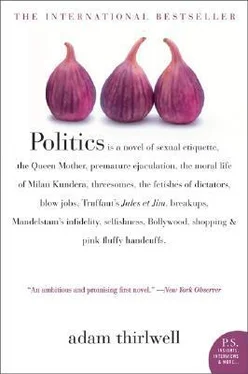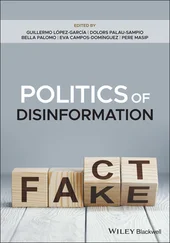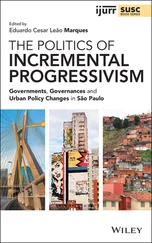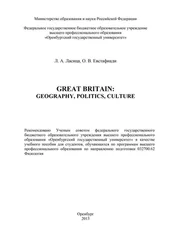Adam Thirlwell - Politics
Здесь есть возможность читать онлайн «Adam Thirlwell - Politics» весь текст электронной книги совершенно бесплатно (целиком полную версию без сокращений). В некоторых случаях можно слушать аудио, скачать через торрент в формате fb2 и присутствует краткое содержание. Год выпуска: 2004, Издательство: Harper Perennial, Жанр: Современная проза, на английском языке. Описание произведения, (предисловие) а так же отзывы посетителей доступны на портале библиотеки ЛибКат.
- Название:Politics
- Автор:
- Издательство:Harper Perennial
- Жанр:
- Год:2004
- ISBN:нет данных
- Рейтинг книги:3 / 5. Голосов: 1
-
Избранное:Добавить в избранное
- Отзывы:
-
Ваша оценка:
- 60
- 1
- 2
- 3
- 4
- 5
Politics: краткое содержание, описание и аннотация
Предлагаем к чтению аннотацию, описание, краткое содержание или предисловие (зависит от того, что написал сам автор книги «Politics»). Если вы не нашли необходимую информацию о книге — напишите в комментариях, мы постараемся отыскать её.
Moshe loves Nana. But love can be difficult — especially if you want to be kind. And Moshe and Nana want to be kind to someone else.
They want to be kind to their best friend, Anjali.
Politics
Politics — читать онлайн бесплатно полную книгу (весь текст) целиком
Ниже представлен текст книги, разбитый по страницам. Система сохранения места последней прочитанной страницы, позволяет с удобством читать онлайн бесплатно книгу «Politics», без необходимости каждый раз заново искать на чём Вы остановились. Поставьте закладку, и сможете в любой момент перейти на страницу, на которой закончили чтение.
Интервал:
Закладка:
The frontage of the kiosks at Targu Jiu station was a collage of adverts. There were adverts for Wrigley’s Spearmint and adverts for Snickers. The adverts for Marathon bars were still there also, although Marathon bars, thought Nana, must have been discontinued at least ten years ago. The air hurt Nana’s skin. It hurt to breathe. As I’ve said, this was a small industrial town. Her dress stuck to her. Papa strode out to the row of taxis and drivers outside the station. He demanded Hotel Europa. A driver smiled.
There was an arrangement of faded multicoloured beads draped over the driver’s seat, like a poncho, and Sellotaped to its back was a felt-tip note occasionally in capitals concerning his children and his unending belief in God. His God was portrayed in a hologram. Nana stared out the smudged window. Half an hour later, twenty pounds lighter, they arrived at the Hotel Europa. This hotel was on a main road, with some Coke parasols on a thin concrete terrace. Papa thanked his driver, as he turned, tugging the suitcase out the boot, and saw the adverts for Spearmint and Snickers, at an angle of thirty degrees on the other side of the station road.
Papa tried not to look downcast. He tried not to be angry. Regaining his poise, in the dark lobby of the postCommunist Hotel Europa, Papa spoke French. He handed over their passports. He marched Nana down the empty corridors. There was a mop with its handle angled into a door. He located their room, on the seventh floor of the empty hotel. Its wallpaper was flowers. It was crimson roses embedded in green leaves.
They dropped the bags then left.
Nana and Papa walked past the Manhatten Martini bar where is always cocktail hour. They reached the main square. In the square, four loudspeakers were playing local radio. And Papa and Nana paraded, scared. They were looking for the park.
This is the cultural bit. In 1935, the president of the Romanian National League of Women, who happened to be the Romanian Prime Minister’s wife, commissioned a war memorial from the famous Romanian sculptor Brancusi. This memorial would be built in Targu Jiu. For this memorial, Brancusi constructed a Gate of the Kiss, a Table of Silence, and an Unending Column. Brancusi was a sculptor with a repertoire. He repeated himself. He repeated himself with variations.
Brancusi’s ‘Gate of the Kiss’ was in the municipal park at Targu Jiu. The gate looked like a dolmen. A dolmen is two vertical stones on which a horizontal stone balances. The ‘Table of Silence’ was in the park too. This was a large block of stone, two metres in diameter, with twelve stone seats. Twelve was symbolic. It was the number of months in a year, and also the number of guests at a traditional Romanian funeral.
Nana stopped at the ‘Table of Silence’. Standing by the table, if she looked back, the ‘Gate of the Kiss’ was at the opposite end of the park. Beneath it, a girl and a boy were kissing. The boy’s hair was sideparted and slick. And if Nana turned round there was a calm lake of oily water.
She was feeling just a tiny bit scared. This was an adventure, and she liked adventure. It was just that it was getting dark. And she wanted to see the last Brancusi before it got dark.
So, after they had chomped and swallowed at speed a hot dog from a stall, Nana and Papa reached the final object
— Brancusi’s ‘Unending Column’, twenty-nine metres high. As they walked there, Nana told Papa all about Brancusi’s home movie of the column, which he filmed when he put the column up in Targu Jiu. He recorded, said Nana, how the clouds and the light changed the column’s shape. They seemed to change its shape, she explained, because the column was a corrugated pole, with endless indentations.
But when they arrived at the column there was a difference. The ‘Unending Column’ wobbled between two racks of scaffolding. The crane next to it was higher. It was in a recreation ground, off a road in the village suburbs. And this all made Nana sad. She tried to imagine that the scaffolding wasn’t there.
It is sad, but sometimes even tourism is not restful.
Papa said, ‘No I like this. I can see what this has to do with architecture. I mean I. I.’ He was trying to be nice. And Nana said, ‘Brancusi said that architecture was just inhabited sculpture.’ ‘Yes of course,’ said Papa. ‘So you see?’ said Nana. ‘Of course sweetie,’ said Papa. ‘He organised his things like architecture,’ said Nana. ‘Uhhuh,’ said Papa. ‘This is architecture,’ said Nana. ‘It’s organised so that you see that church behind.’
It was true. If you looked very hard, in the twilight, you could just see a small bronze dome.
‘I’ve got a headache,’ said Papa. ‘No I really have.’
They walked back to the Hotel Europa.
Papa went into the minuscule bathroom and locked it. Coy about the sounds he made, he turned on the hot tap in the bath while he pissed. Then he turned on the cold as well, brushing his hand through the water, and squeezed in the non-fitting rubber plug. He sat down on the loo seat. He stood up and trod off his shoes via each ridged heel. Then he stared into the smeary mirror. He had a headache.
8
Nana and Papa returned to Venice for the last four days. This was Papa’s part of the holiday. It was his non-cultural time. For the last four days, they were both going to sit and eat and drink. They would not look at art. They would not look at architecture.
Papa and Nana went walking, looking for bars. The squares they crossed were almost deserted. From time to time a late courier came past, on a water bike. Boxes of avocados were being unloaded on to a gondola, supervised by a man with a list Biroed on the back of a receipt. There was one open window in an office and a woman sitting in front of the fluorescent mauve pod of an Apple iMac had turned away from it and looked thoughtfully out at Nana and Papa as they passed.
This is an idyll. This whole chapter is an idyll.
For instance, in the Paradiso Perduto bar, Nana had just taught Papa how to roll and smoke a joint. She was teaching him about marijuana because she was worried about his headaches. She thought that hash might be a cure. That was how idyllic it was.
Nana said, ‘Do you remember that restron, that one called My Old Dutch, and you’d take me there after the dentist.’ She said, ‘I don’t understand why pancakes. And anyway. Now lick it. Lick the paper. Yeah. And the pancakes were just so much huger than the plates and the plates were huge enough.’ Papa said, ‘That was when you were a vegetarian, so I became a vegetarian.’
This is what she loved, thought Nana. She loved remembering.
She said, ‘That was a cool place.’
Then there was a pause. It is difficult to express a pause. It can be expressed only by what happens simultaneously. For instance, this pause was long enough for Nana to watch Papa tear off a piece of card from a box of Paradiso Perduto matches, try to squeeze it in as a roach, and then tear it in half so that it was smaller.
She said, ‘I think I might.’ She said, ‘I was thinking I might move in with Moshe.’
She was moving in with Moshe? She was moving in with Moshe?!
It was true. She had made a decision. I have kept it from you like this so that you can be surprised too. You can compare your own reaction with Papa’s reaction.
Papa’s reaction was happiness. He was happy. He was purely happy for Nana.
Now obviously, Papa had not been a witness to a threesome. He did not know all the facts. He did not know about Nana and Anjali. He did not know, for example, that Nana had started to enjoy the phrase ‘menage a trois’.
In celebration of Nana’s happiness, Papa, the benevolent angel of this story, lit up and took a long drag on his fat and badly made spliff.
Читать дальшеИнтервал:
Закладка:
Похожие книги на «Politics»
Представляем Вашему вниманию похожие книги на «Politics» списком для выбора. Мы отобрали схожую по названию и смыслу литературу в надежде предоставить читателям больше вариантов отыскать новые, интересные, ещё непрочитанные произведения.
Обсуждение, отзывы о книге «Politics» и просто собственные мнения читателей. Оставьте ваши комментарии, напишите, что Вы думаете о произведении, его смысле или главных героях. Укажите что конкретно понравилось, а что нет, и почему Вы так считаете.












